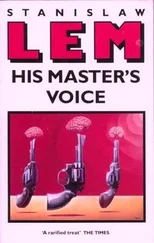“It’s nothing. Please don’t be concerned. The right hemisphere is the one with spatial ability, so it’s adept at this type of function. I would ask you again, Mr. Tichy, to sit well away from the desk, the wires, everything. It will facilitate our deliberation as to the therapy indicated.”
“I only want to know where my consciousness is,” I replied, freeing the wire from my foot, which wasn’t easy because the foot pressed hard on the floor. “Was it I who pulled your chair out from under you, and if not I, then who?"
“Your lower left extremity, governed by the right hemisphere.” The professor adjusted his glasses on his nose, moved his chair farther away from me, and after a moment’s hesitation stood behind the chair instead of sitting down. Which of my hemispheres suspected that the next time he might counterattack?
“We could go on like this until Judgment Day,” I said, feeling my left side tense up. Uneasy, I crossed my legs and my arms. McIntyre, watching me carefully, continued in a pleasant voice.
“The left hemisphere is dominant thanks to the speech center. Talking with you now, I’m speaking to it; the right side can only listen in. Its capacity for language is extremely limited.”
“Perhaps in others but not in me,” I said, holding my left wrist with my right hand, to be safe. “It’s mute, yes, but I’ve taught it sign language, you see. Which wasn’t easy.”
“Impossible!”
The gleam in the professor’s eyes, I had seen it before in his American colleagues, and immediately regretted telling him the truth. But it was too late now.
“The right hemisphere can’t conjugate verbs! That’s been proved…”
“Doesn’t matter. Verbs are unnecessary.”
“All right, then. Ask it, please, I mean ask yourself, what it thinks of our conversation? Can you do that?”
I put my right hand in the left one, patting it a few times to pacify it, because that was the best way to begin, then made signs, touching the palm of my left hand. Its fingers began to move. I watched them for a while, then, trying to hide my anger, put the left hand on my knee, though it resisted. Of course it pinched me hard on the thigh. I didn’t retaliate, not wanting to wrestle with myself in front of the professor.
“Well, what did it say?” he asked, imprudently leaning forward from behind the chair.
“Nothing really.”
“But I saw myself that it made signs. They weren’t coherent?”
“Coherent, yes, very coherent, but nothing important.”
“Tell me! In science everything is important.”
“It said I’m an asshole.”
The professor didn’t even smile, he was so impressed.
“Really? Ask it about me now.”
“If you wish.”
Again I addressed my left hand, and pointed at the professor. This time I didn’t have to pat it; it replied immediately.
“Well?”
“You’re an asshole too.”
“Is that what it said?”
“Yes. It may not be able to handle verbs but it can make itself understood. I still don’t know who is speaking. Speaking with fingers or lips, it makes no difference. In my head, is there an I and an It as well? And if an It, how is it I don’t experience what it experiences even though it’s in my head and part of my brain? It’s not external, after all. If my consciousness was doubled and everything confused, I could understand that — but this, no. Where did it come from, this It? Is it also Ijon Tichy? And if so, why do I have to speak to it indirectly, by signs, professor? And why does it cause me so much trouble?” No longer seeing any sense in reticence, I told him all about the scenes on the subway and the bus. He was fascinated.
“Blondes only?”
“Mainly. They can be bleached blondes.”
“Is this still going on?”
“Not on the bus.”
“Elsewhere?”
“I don’t know, I haven’t tried. I mean, I haven’t given it the opportunity. If you must know, I was slapped several times. It embarrassed and angered me, being slapped, because I wasn’t guilty, yet at the same time I was pleased. But once a woman slapped me and the slap landed fully on the left cheek, and when that happened I didn’t feel the slightest pleasure. I thought this over and finally figured out the reason.”
“But of course!” cried the professor. “When the left-hemisphere Tichy was slapped on the cheek for the right-hemisphere Tichy, the right-hemisphere Tichy was pleased. But when the slap was wholly on the left, it didn’t like that at all.”
“Exactly. So there is some sort of communication in my unfortunate head, but it appears to be more emotional than rational. Emotions too are experience, though not conscious experience. But how can experience be unconscious? No, that Eccles with his automatic reflexes was all wet. To see an attractive girl in a crowd, and maneuver yourself close to her, and pinch her — that’s a whole premeditated plan of attack, not a bunch of mindless reflexes. But whose plan? Who thinks it, who is conscious of it, if it’s not mine?"
“It can be explained,” said the professor, excited. “The light of a candle is visible in the dark but not in the sun. The right brain may have consciousness, but a consciousness as feeble as candlelight, extinguished by the dominant consciousness of the left brain. It’s entirely possible that —”
The professor ducked, avoiding a shoe in the head. My left foot had slipped it off, propped the heel against a chair leg, then kicked it so hard that the shoe flew like a missile and crashed into the wall, missing him by a hair.
“You may be right,” I remarked, “but the right hemisphere is damned touchy.”
“Perhaps it feels threatened by our conversation, not fully understanding it or misunderstanding it,” said the professor. “Perhaps we should address it directly.”
“You mean, the way I do it? That’s possible. But what do you want to say to it?”
“That will depend on its response. Yours, Mr. Tichy, is a unique situation. There’s never been a person completely sound of mind, and not an ordinary mind at that, who underwent a callotomy.”
“Let me make myself clear,” I answered, stroking the back of my left hand to calm it because it was starting to move, flexing the fingers, which worried me. “I am not interested in sacrificing myself for science. If you or someone else enters into communication with It — you know what I mean — that could turn out to be harmful to me, let alone damned unpleasant, if, say, it becomes more independent.”
“That’s quite impossible,” declared the professor, a little too confidently, I thought. He took off his glasses and wiped them with a piece of flannel. His eyes did not have that helpless expression of most people who can’t see without their glasses. He gave me a sharp look as if he didn’t need them at all, then immediately dropped his eyes.
“What happens is always quite impossible,” I said, weighing my words. “The whole history of mankind consists of impossibilities, and the history of science too. A certain young philosopher told me that my condition is an impossibility, contradicting all established thought, which says that consciousness is an indivisible thing. The so-called split personality is essentially a consciousness that alternates between different states joined imperfectly by memory and a sense of identity. It’s not a cake that can be cut into pieces!”
“I see you’ve been reading the literature,” observed the professor, putting on his glasses. He added something I didn’t hear. I was going to go on but stopped because my left hand was putting its fingers into my right palm, making signs. That had never happened before. McIntyre saw me looking at my hands and understood immediately.
Читать дальше












